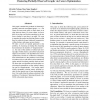Free Online Productivity Tools
i2Speak
i2Symbol
i2OCR
iTex2Img
iWeb2Print
iWeb2Shot
i2Type
iPdf2Split
iPdf2Merge
i2Bopomofo
i2Arabic
i2Style
i2Image
i2PDF
iLatex2Rtf
Sci2ools
112
click to vote
CORR
2011
Springer
2011
Springer
Clustering Partially Observed Graphs via Convex Optimization
This paper considers the problem of clustering a partially observed unweighted graph – i.e. one where for some node pairs we know there is an edge between them, for some others we know there is no edge, and for the remaining we do not know whether or not there is an edge. We want to organize the nodes into disjoint clusters so that there is relatively dense (observed) connectivity within clusters, and sparse across clusters. We take a novel yet natural approach to this problem, by focusing on finding the clustering that minimizes the number of ”disagreements” i.e. the sum of the number of (observed) missing edges within clusters, and (observed) present edges across clusters. Our algorithm uses convex optimization; its basis is a reduction of disagreement minimization to the problem of recovering an (unknown) low-rank matrix and an (unknown) sparse matrix from their partially observed sum. We show that our algorithm succeeds under certain natural assumptions on the optimal clust...
Related Content
| Added | 19 Aug 2011 |
| Updated | 19 Aug 2011 |
| Type | Journal |
| Year | 2011 |
| Where | CORR |
| Authors | Ali Jalali, Yudong Chen, Sujay Sanghavi, Huan Xu |
Comments (0)

